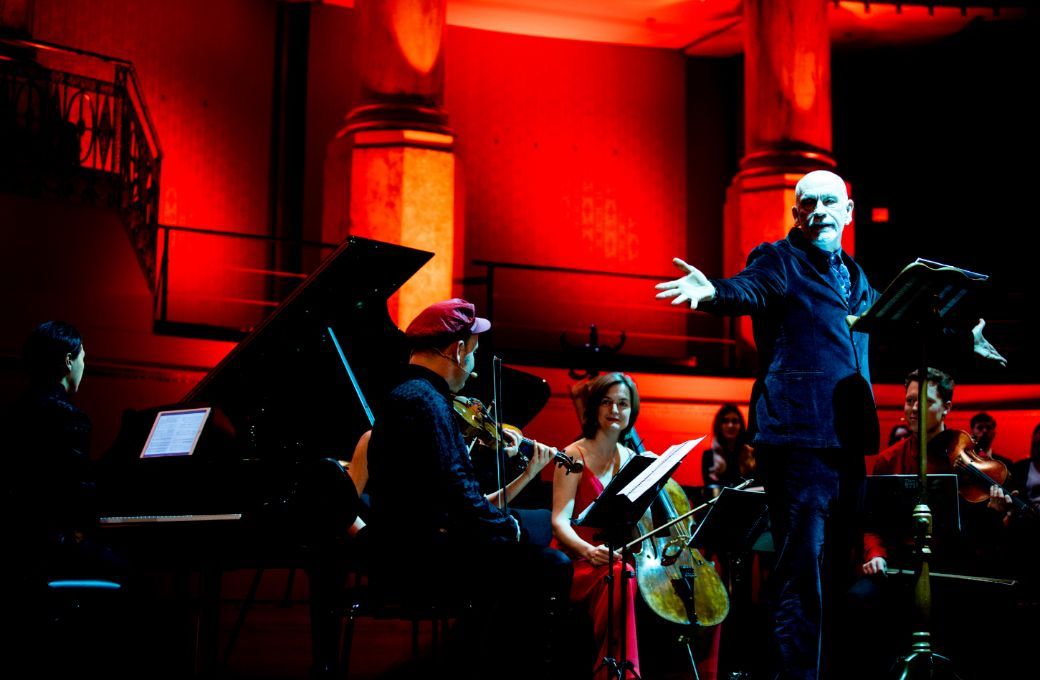Actor Adrien Brody took to the stage alongside John Malkovich and a string quartet at New York City’s Beacon Theatre and, after silently acknowledging the roar of applause from a packed house, assumed a seat at the piano – only to be quickly shooed away by Hyung-Ki Joo, who took the bench that was properly his. Brody wasn’t to be seen again.

It was the sort of gag that keeps The Music Critic – a show writer/violinist Aleksey Igudesman and Malkovich first performed in 2010 – light and helped keep the Beacon, a large house on Manhattan’s Upper West Side, from overinflating with pomposity and vitriol, despite the bulk of the script. The ensemble, once settled, proceeded to play a selection by Dvořák, which Malkovich-as-critic quickly and roundly denounced as “ugly, unnatural and ghastly”.
All of the reviews quoted in the show are actual, published texts. Malkovich delivered them as monologue, rehearsed oratory that befit the egos behind them, sometimes speaking over the passages he was critiquing (“Chopin is by no means a composer dealing in the ordinary. He is worse”), at one point even silencing the musicians with a slight, reprimanding gesture of his hand. In the measured delivery of smug, self-satisfied vindictiveness, Malkovich creates a character, staying true to his trademark deadpan even as he rips up scores and snatches bows. Some of the quoted excerpts I’d be proud to have written, although I don’t know at whom I would aim such malicious quips. The barbs, however, apparently aren’t the point.
“It’s not at all a snobby piece,” Malkovich said in a joint interview with Igudesman prior to the NYC show. “The criticisms are very clearly written, beautifully written, elegantly phrased.”
Despite considerable throwing of shade, Igudesman doesn’t consider the show to be anti-critic.
“It’s definitely nothing spiteful in any way”, Igudesman says. “In actuality it’s celebrating criticism throughout the centuries, about how one should take criticism in one’s stride”.
Nor is it intended solely for the cultural elite.
“I don’t think we want to go just for the music aficionados among us”, he says. “In Europe, we had a very mixed audience.”
The Music Critic might not be snobby, but it certainly has bite, even turning at times to well-known postulators: Tchaikovsky for one, who wrote that Brahms’ music was “chaotic and absolutely empty, dried-up stuff”, or Nietzsche, avowing that Brahms “has the melancholy of impotence.” At the Beacon, those sorts of sideswipes drew rounds of laughter.
In this critic’s humble opinion, classical music humour tends toward the insufferably precious. Simply put, it’s not something I rush toward. But intrigued by Malkovich’s participation in the show, I looked up Igudesman – who conceived of the show and developed it with Malkovich – and found myself not just watching but actually laughing out loud at his videos with violinist Hyung-ki Joo, who is also a part of the Music Critic tour. (Cellist Antonio Lysy, violist Hsin-Yun Huang, and violinist Claire Wells complete the ensemble.) Their version of the Gloria Gaynor hit “I Will Survive”, which can be found on Youtube, illustrates quite well how humour can recontextualize a song in ways that bring insight as well as laughs. Other videos are remarkably clever, and not in a bad way.
An author, poet and filmmaker as well as composer and musician, Igudesman studied at the Vienna Conservatory and has recorded several imaginatively programmed recordings with the trio Trilogy (with violinist Daisy Jopling, and cellist Tristan Schulze). His recent documentary Breaking Rachmaninoff is an investigation into the insecurities of composers, and includes Malkovich among its interviewees. He points out in our conversation that devastating criticism after the premiere of his first symphony led Rachmaninov into a three-year depression during which he all but abandoned composing.
“That is a very sad occurrence in my view”, Igudesman says, adding that he wanted to “spread the message that you don’t have to take it so hard as Rachmaninov did.”
Malkovich has music in his background: he sang in madrigals and played guitar in college. In more recent years, he has worked as a voice actor in musical settings and portrayed an opera singer in the 2014 film Casanova Variations. And he remains an avid appreciator. The third movement of Schumann’s Piano Quintet in E-flat, Op. 44, he says in the course of our conversation, “to me is one of the most beautiful things ever done by a human”.
As an actor, of course, Malkovich has had his share of interactions with critics, although, he says, he’s able to take it in his stride.
“The critics have their public, who have entrusted this or that critic with responding to a play or a movie or a piece of music in a way that the member of the public would respect or appreciate”, he says. “When I first started theatre at Steppenwolf in Chicago, I was the liaison with all the critics. I’ve always had a very personable relationship with critics and still do. I’m not very easily offended. I think it’s silly for the most part to think that when you introduce something into the public sphere, all the responses will be positive. That wouldn’t even be very healthy.”
The Beacon date concluded an eight-city US tour, during which the show grew to include, for example, a new section on Debussy and recent reviews of the show itself. It continues to be a work in progress, Igudesman says, as “any good touring piece or running piece should be. The moment you think it’s finished, that’s maybe the time to leave it.”
“Every time we do it, there are little changes”, Malkovich adds. “It’s a living thing. If you promise to write a really bad review, we'll make you famous and invite you to the press conference. We’ve done it before.”
The show’s evolution will take a giant leap in Luxemburg this month to include full orchestration. The orchestrated Critic will receive its US premiere in Portland with the Oregon Symphony next year.
Late in the show, the musicians turned the tables, with a review of Malkovich’s performance in The Infernal Comedy which they’d set to music and “forced” the actor to read aloud. That review, titled “The Malkovich Torment”, was a “spectacularly well written, hilarious review, really written from the heart and spleen”, Malkovich says during our interview. (He took it a little less well onstage.) Such moments were a bit contrived but funny enough to be forgiven. Malkovich then read a review from the previous night on the Music Critic tour, proclaiming that “the entire production feels like a Saturday Night Live skit if PBS had produced SNL”, and again, I sat wishing I had written that line.
Somehow, stating that “everyone’s a critic” casts an air of derision, just as the word “criticism” has acquired a negative connotation. But the fact is, every one of the some 2,800 people in the audience at the Beacon that night had an opinion about the show. Some, no doubt, didn’t like it, and some few had the power of the press (or the blog or the podcast) to broadcast their opinions. The audience was full of critics.
“Art in the end, no matter what we might tell ourselves, is still a highly subjective thing”, Malkovich tells me. “I marvel at what people are capable of creating, but I do think it’s nonsense when you’re in a creative field to think that everything you do will be adored.”
The Music Critic continues at Philharmonie Luxembourg, November 6th and the Oregon Symphony, Portland, June 12th 2024.


